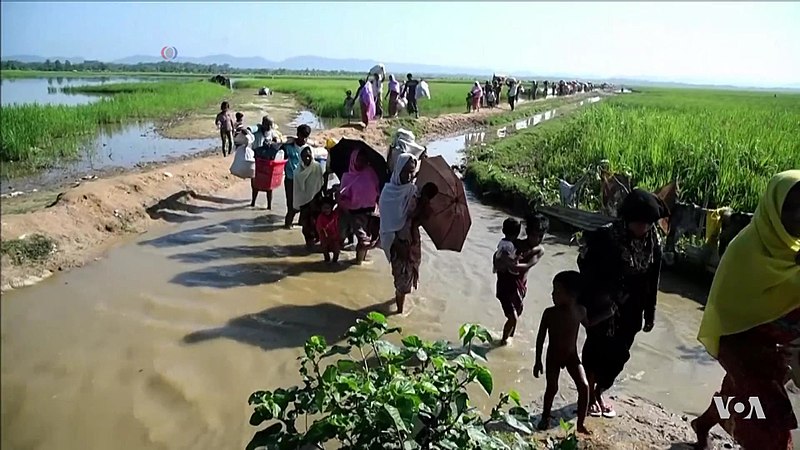The ongoing pandemic has put an enormous strain on the infrastructures that exist meekly in most South Asian countries. At its best, we see robust contact tracing practices and the existence of a rapid action health care system as witnessed in Sri Lanka. At its worst, we see the total systemic collapse as in the case of Bangladesh and even India.
With a weak healthcare infrastructure and inadequate value chains in the country, Bangladesh not only is fighting a global pandemic but also 1.1 million Rohingya refugees that are continually struggling for their survival with no avail.
As noted by Human Rights Watch and Amnesty International, Rohingya refugees currently have no control over their lives or even be given a chance to speak about their concerns and problems. Earlier this year, about 200 refugees were taken to a remote island named Bhashan Char which the UN has not even deemed to be liveable yet due to the high concentration of clayey silt in the area. The refugees were forcefully taken away from their families only to be put on an island with negligible health care facilities and lack of employment opportunities in lieu of declaring the island liveable.
Reports surfaced that Bangladeshi authorities tried to dispose of over 1400 Rohingya men, women and children on the border of Malaysia which was thwarted due to the fact that Malaysian authorities refused to offer them refuge. There were also reports of assault and battery by the hand of Bangladeshi officials at the island.
The Bangladeshi government, on one hand, wants international cooperation to begin the refugees’ repatriation to Myanmar but on the other hand, are failing to meet the International Covenant on Civil and Political Rights and it’s codified laws that direct Bangladesh to provide a right to life to the Rohingyas.
Bangladesh’s failure in providing refuge to Rohingyas
By hundred of personal accounts and field research, it has been found that women in the refugee camps are facing repeated sexual assault, human trafficking, and gender-based discrimination at the hands of the authorities. Violence in households are extremely frequent brought on by the lack of employment and other factors.
For more than a year, access to high-speed internet was restricted in the camps and even when the country’s Foreign Secretary Masud Bin Momen announced the restoration of broadband services in the area, the internet still remains a sought after commodity with mostly extremely limited access.
Healthcare and education remain one of the biggest problems in the camps. The Bangladesh government assured Rohingyas that they would be studying a Myanmar curriculum in January 2020, but the subsequent pandemic has completely halted the children’s’ education.
Myanmar’s refusal to facilitate repatriation
The United Nations estimates that about 1 million Rohingya Muslims have been displaced from Rakhine since 2017, most of them now residing in Bangladesh’s Cox Bazaar. The constitution of a Joint Working consisting of UNHCR, Bangladesh, and Myanmar in 2017 led to further disappointments when upon Bangladesh sending a list of 8,000 refugees to Myanmar for repatriation, only 374 were selected by Myanmar.
The government of Myanmar has systematically failed to gain the trust of the refugees and so far there have been two failed repatriation attempts made by the government but the very fact that the refugees have refused to turn back to the country has posed a cause of concern not only for Myanmar and its international standing but Bangladesh and its resources too. An independent fact-finding committee constituted by the UN has found several military chiefs and officials of Myanmar to be guilty of genocide and crimes against humanity but the vehement denial of the facts by the country’s leader Nobel Laureate Aung San Suu Kyi has further dwindled the trust of the refugees.
Why the Rohingya Crisis should (still) concern us all
The Rohingya crisis has only gotten worse over the years due to continued violence within the camps and the sheer lack of refusal of multiple governments to take charge and provide solace to this community. It may come as a shock to most who have heard and are aware of the Uighurs in Xiangang province of China and the Chinese government’s inhumane treatment of a large population due to their faith that China in fact has actively encouraged bilateral dialogue to solve the crisis which is quite contradictory to its position on Muslim Uighurs where the country wants no foreign interference.
Reports of increased violence from within the camps have become increasingly prominent with clashes within the communities taking place as late as October 6, 2020, leading to the death of 4 people and a number of injuries. Border tensions between Myanmar and Bangladesh are beginning to increase due to the crisis. Repeated reports of deaths due to malnutrition are being reported from within the camp. Those trying to escape have had absolutely no luck in doing so with hundreds of refugees being stuck at sea for a whopping 6 months because they were prevented from docking in Malaysia.
The systematic othering of Rohingya Muslims by countries and the international community sheds a light on the failure of a globalised era which on one hand encourages countries to work together to grow while on the other taking convenient positions on not aiding the plight of millions of people who for the past 8 years have been the target of inhuman crimes and genocide.
To find out how you can help Rohingya refugees please click here .

